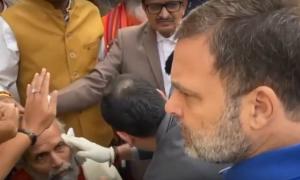The conference through Friday among the 10-member Association of Southeast Asian Nations and 14 Asia-Pacific partners had anti-terrorism efforts on the agenda. Australia was set to join a regional nonaggression pact to warm ties with neighbors that often have viewed it with mistrust.
The meeting received a blow Monday when host Laos announced that Japanese Foreign Minister Nobutaka Machimura would not attend. No reason was given.
US Secretary of State Condoleezza Rice had announced earlier that she would not attend.
ASEAN diplomats read that as a snub over the group's failure to get Myanmar's junta to hand power to a civilian government and free pro-democracy leader Aung San Suu Kyi.
An ASEAN diplomat said the Myanmar issue split the group, with most members pushing for the junta to give up its turn while Cambodia and communist countries Laos and Vietnam urged it not to buckle under pressure. He spoke on condition of anonymity to avoid a diplomatic row.
Laos, Vietnam, Cambodia and Myanmar are ASEAN's poorest countries and traditionally support one another.
The US and European Union have threatened to boycott ASEAN meetings if Myanmar takes up the chairmanship, and Southeast Asian nations fear that could endanger trade ties with the West.
The diplomat said Myanmar Foreign Minister Nyan Win would indicate the junta's stand during an informal dinner with his ASEAN counterparts later Monday.
ASEAN's mixed signals to Myanmar have complicated efforts to get the country to reform, said UN envoy to Myanmar Razali Ismail, who was in Vientiane to meet with Nyan Win.
"It is not as if ASEAN countries have been collectively strong in putting out a clear signal to Myanmar," Razali told The Associated Press.
Countries like Malaysia, Indonesia and Singapore have been "quite forthright, but we have not heard from the others," Razali said.
Criticism from the West tends to have little effect on Myanmar's leaders, who decide matters "in their own time," he said.
Still, there were indications that Myanmar could voluntarily give up the chairmanship, Thai Foreign Minister Kantathi Suphamongkhon said in Bangkok on Monday.
"Myanmar has sent a good signal that it will take into account the importance of ASEAN's interests and will not do anything that will obstruct the development of ASEAN and its relation with other countries," he said.
Meanwhile, Laotian Deputy Foreign Minister Bounkeut Sangsomsak said Japan's absence "will not effect most of the meeting," and should not be seen as a Myanmar-related pressure tactic.
Machimura went to London on Sunday for talks with European leaders on Japan's proposal to expand the UN Security Council and to give Japan and some other countries permanent seats. He was due back in Japan this week, and it wasn't clear why he couldn't attend any of the Laos meetings ending Friday.
One of the highlights in Vientiane will be Australia's signing of a declaration of intent to join a nonaggression pact with ASEAN. Canberra would then be expected to sign the pact by December, helping its campaign to boost trade ties with Asian neighbors.
The meetings also will discuss terrorism and agreements on sharing intelligence, officials said. ASEAN officials also planned to meet with human rights activists to discuss setting up a regional human rights commission, an idea floated by Indonesia in 2003.
ASEAN nations Brunei, Cambodia, Indonesia, Laos, Malaysia, Myanmar, Philippines, Singapore, Thailand and Vietnam are holding ministerial meetings this week.
They are joined for meetings of the broader, security-oriented ASEAN Regional Forum by Australia, Canada, China, European Union, India, Japan, Mongolia, New Zealand, North Korea, Pakistan, Papua New Guinea, Russia, South Korea and the United States.








More from rediff